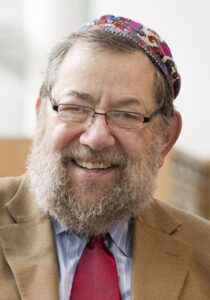״אין לך פרשה שאין בה תחיית המתים אלא שאין בנו כח לדרוש״ (ספרי האזינו ש״ו)
There is no portion in the Torah that cannot be brought back to life, if only we had the strength to interpret!” (Sifrei, Ha’azinu 306:35)
1
וידבר יהו״ה אל משה בהר סיני לאמור…ושבתה הארץ שבת ליהו״ה “Y-H-W-H spoke to Moses at Mount Sinai, saying…the land shall rest in a godly Sabbath (25:1-2). Rashi famously opens by asking: “What does the Sabbatical have to do with Sinai?” Why, among all the many commandments, should this be specifically designated as spoken at the Mountain?
The Talmud (b. Sanh. 39a) explains the commandment this way: “Plant for six years and rest in the seventh, so that you will know that the land belongs to Y-H-W-H.” But, in the broadest sense, that is the purpose of all the other commandments as well! The earth is filled with God’s presence since its creation. That did not begin at Sinai. Torah was given to provide us with a way to discover that presence, and a path of living in response to it.
“The world was created by ten divine utterances,” says the Mishnah (Avot 5:1). These ma’amarot are the ten times God says “Let there be” in the opening chapter of Genesis. (There are only nine, but the word bereshit itself is counted as the first). These utterances live forever; they are the underlying structure of reality, waiting to be discovered. They are present in the earth, as they are in the heavens. At Sinai they are repeated in the form of the ten dibrot (we call them “commandments,” but dibrot is really another way of saying “utterances”). These constitute a set of keys for revealing a presence that is already there. They do this by converting the passive sense of presence into a set of imperatives. “Following this path will lead you to a life in which God’s presence is revealed.” Revealed right where you are, living on earth.
The Sabbatical rule takes Shabbat, the most distinctive practice of Jewish living, and applies it to the land itself. What better way to teach that “the whole earth is filled with God’s glory?”
It is true that the Torah applies the Sabbatical only to the particular land that Israel is about to be given. But the word ha-arets makes no distinction. The prophet’s proclamation of God’s glory, melo khol ha-arets kevodo (Is. 6), does not refer only to the Land of Israel. Neither does the psalmist’s “Earth (ha-arets) and its fullness are God’s (24:1).” Our call to treat our particular land this way is paradigmatic, teaching reverence for the earth as a whole. The Land of Israel, the Sefat Emet teaches, became an exception to the category of lands in order to teach us about the holiness of all land, of the very soil itself. Torah has no more important lesson for our generation. We need to understand that this one comes from Sinai itself.
2
והיתה שבת הארץ לכם לאכלה לך לעבדך ולאמתך ולשכירך ולתושבך הגרים עמך “The land’s Sabbath, during which you do not eat of it, includes you, your manservant, your maidservant, your hireling, and the stranger who dwells with you. It shall be fodder for your cattle and the wild animals who are in your land (25:6-7).” This very thorough listing means that the land is to be free from any human manipulation, by Israelites or anyone else who is in their charge. It is to revert to its truly natural state, as it was before it was transformed by humans living upon it. One has a feeling that the land itself here is personified. It too has a right to rest.
The modern return of Jews to the Land of Israel brought about a need to evade the laws of the sabbatical year. It is claimed that a contemporary economy could not survive such periods of abstinence. Various halakhic solutions are offered to enable this negation of the Torah’s command; only the most strictly pious continue to attempt to observe it.
But what should be kept in the spirit of shemitah? A great seventh year dedication to preserving the resources of the earth seems to cry out for fulfillment. We should find a way to extend this beyond the borders of the Land of Israel as well.
3
וקדשתם את שנת החמישים שנה וקראתם דרור בארץ לכל יושביה “Make the fiftieth year holy and proclaim freedom in the land for all who dwell upon it (25:10).” The jubilee is total, embracing everyone: Israelites, male and female; slaves, Israelite and foreign; strangers, sojourners – everyone. Whom might we include today? Illegal immigrants? Prisoners? Victims of domestic abuse? Victims of cults? Victims of internal enslavement, including addictions? Where does “all those who dwell upon it” end?
“Nowhere” is the answer. The jubilee is a call for radical liberation, for all who dwell upon the earth. We cannot and will not fully enact it in our world. But the loud shofar blast that calls for it should ever be ringing in our ears.
But it is such a liberation for you as well. The sabbatical returns the earth to Y-H-W-H; the jubilee calls for a return of the self to its Source. That is the harder task.
4
והארץ לא תמכר לצמיתות כי לי הארץ כי גרים ותושבים אתם עמדי “Land shall not be permanently sold, because the land is Mine; you are strangers and sojourners with Me (25:23).”
A good reminder, just as written.
On the second half of the verse, a favorite Hasidic teaching (completely out of context, of course) by the Ba‘al Shem Tov’s grandson:
“For you are strangers and sojourners – with Me.” I once heard from a wise person a comment on “I am a stranger on the earth; do not hide Your command from me (Ps. 119:19).” We know how things are. The ger (he is understanding the word both as “convert” and “stranger”) really has no one to attach himself or to be close to, telling them everything going on in his heart. He has no [true] friend, neither Jew nor Gentile. But when he meets another ger, each of them tells the other everything, all that is happening.
We know that the blessed Holy One is like a ger in this world, with no place for His glorious presence to dwell, since there are so few [who really know how to call Him forth]. This is what King David meant by praying “I am a stranger on the earth.” “I too,” he is saying, “do not want to dwell on this earth; I am only a stranger here.” Therefore “Do not hide Your command from me” – like one ger finds another and tells him everything that is in his heart.
This is the hidden meaning of “You are strangers and sojourners – with Me.” When you are like strangers in this world and sojourners (read as: “residents”) of the coming world, you are “with Me.” I too am a stranger in this world, so surely I will not “hide My command” from you.
There is much to be said on this text. Its empathy – here depicted as God’s empathy – with the convert’s situation is truly remarkable. But so too is his reading of the psalmist’s confession of his lonely path – only to discover the God who is a fellow stranger.
5
“For any land to which you become attached, bring redemption to that land (25:24).”
The word ge’ulah, “redemption,” has strong spiritual echoes. It is most associated with God’s redemption of Israel from Egypt and the future redemption of the world. The idea of redeeming the land is therefore very striking.
The current Zionist appropriation of this verse makes it difficult to read it in any other way. The Jewish National Fund and others have long used it as a slogan to refer to getting ever more of the Land of Israel subject to Jewish ownership (or ownership by the State of Israel), “redeeming” it from the hands of others.
But this cannot be all that it means. Ever since lekh lekha we have seen Hasidic readings of erets as referring to artsiyyut, material possessions, “earthly” things. Thus our verse can be read to say: “Any attachment we have to the corporeal realm has to be for the sake of redemption.”
That is the Torah’s story as we understand it. We were sent down into Egypt, given an ahuzah in its richest soil, the Land of Goshen, (think of Westchester or Beverly Hills), in order to uplift and redeem sparks of holiness that were trapped there. Those were the shiny vessels we “borrowed” from the Egyptians as we were leaving. We were sent into exile throughout the world for the same purpose. There is a reason why the root g-l-h means both “exile” and “reveal.” The great miracle of the Return to Zion has to mean the same thing, bringing true redemption to that holy place.
Here I am sympathetic to the views of Rav Kook. The return of the Jewish people to the land, to the body, and to history has been a necessary and positive step. I would like to believe that this whole process may indeed be, as his followers said, reshit tsemihat ge’ulateu, “the beginning of the redemption that we will bring about.” That redemption will indeed require tsemihah; it will have to grow out of the land, the way we learn to treat it and all those who live upon it. That includes the way we learn to share it with others who live upon it. So far, signs of that “redemption” are pretty slow in revealing themselves. There is much reason for disappointment. But “even if they delay, we will wait” for them. We have not given up. “Never despair! Says Rabbi Nahman. We can’t afford to.

Prof. Rabbi Arthur Green was the founding dean and is currently rector of the Rabbinical School and Irving Brudnick Professor of Jewish Philosophy and Religion at Hebrew College in Newton, MA. He is Professor Emeritus at Brandeis University, where he occupied the distinguished Philip W. Lown Professorship of Jewish Thought. He holds a Ph.D. from Brandeis University and Rabbinical Ordination from the Jewish Theological Seminary of America. Green is author, editor, and translator of over twenty books, among which are Tormented Master: A Life of Rabbi Nahman of Bratslav and Keter: The Crown of God in Early Jewish Mysticism (Jewish Lights, 2013), The Light of the Eyes by R. Menaḥem Naḥum of Chernobyl (Stanford, 2021), and Judaism for the World: Reflections on God, Life, and Love (Yale, 2020), winner of the National Jewish Book Award.





Comments are closed.